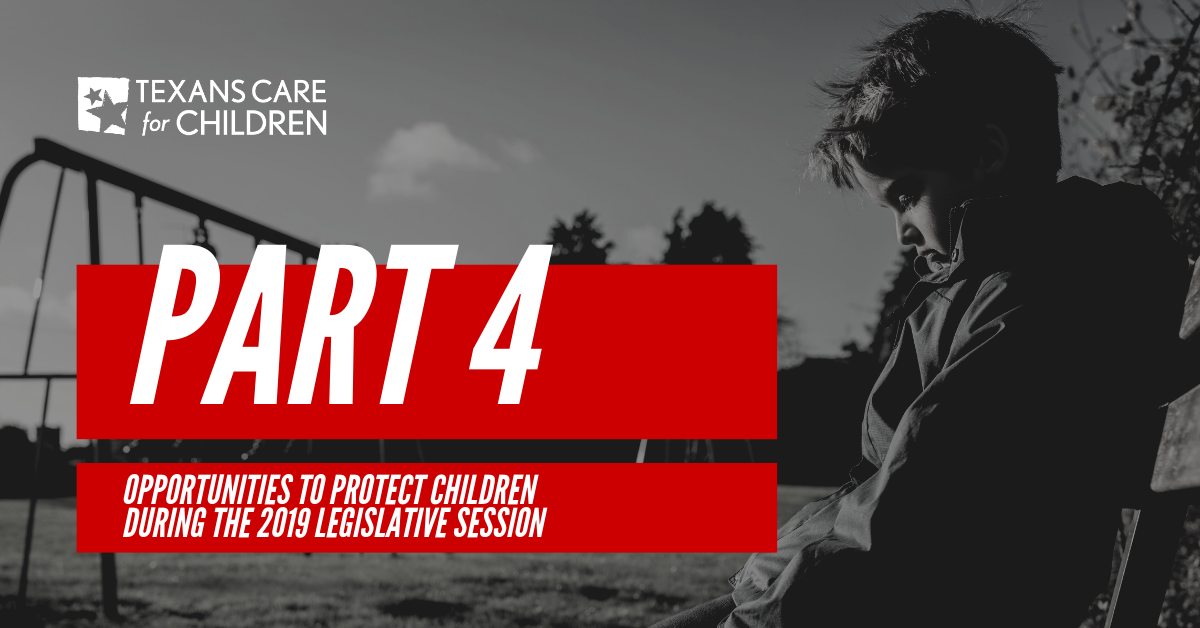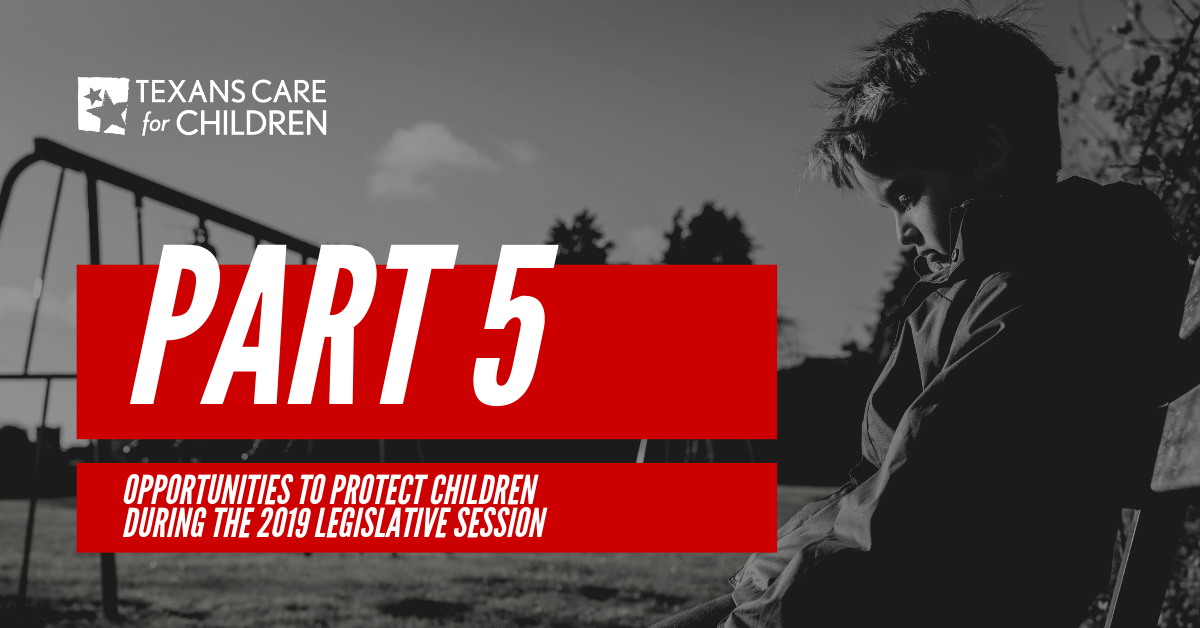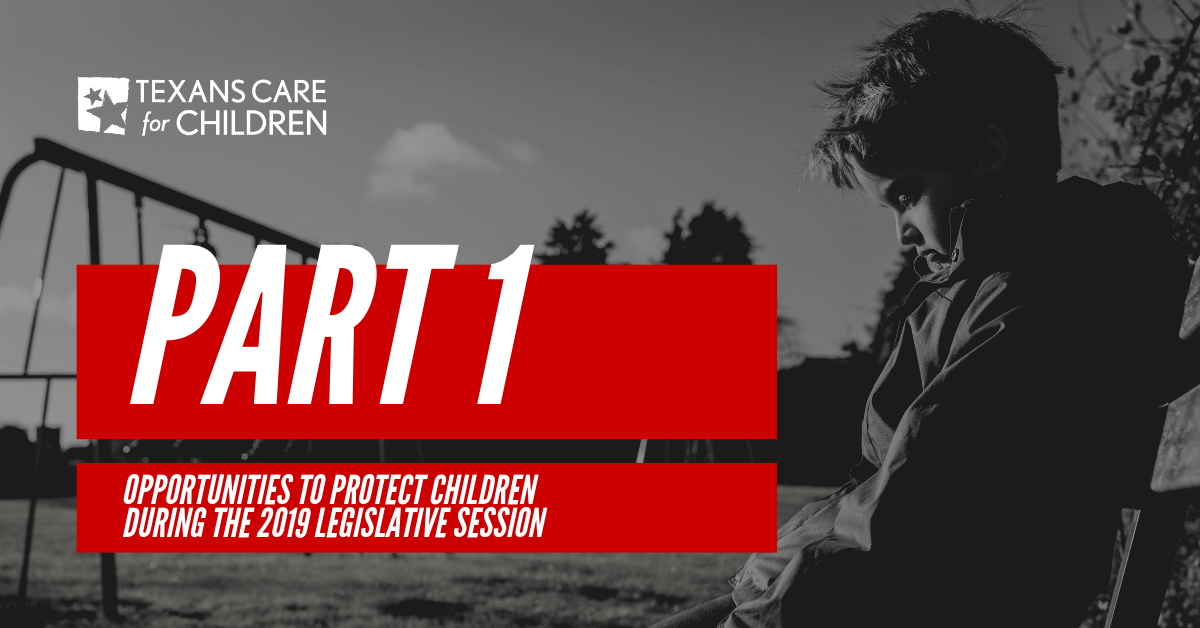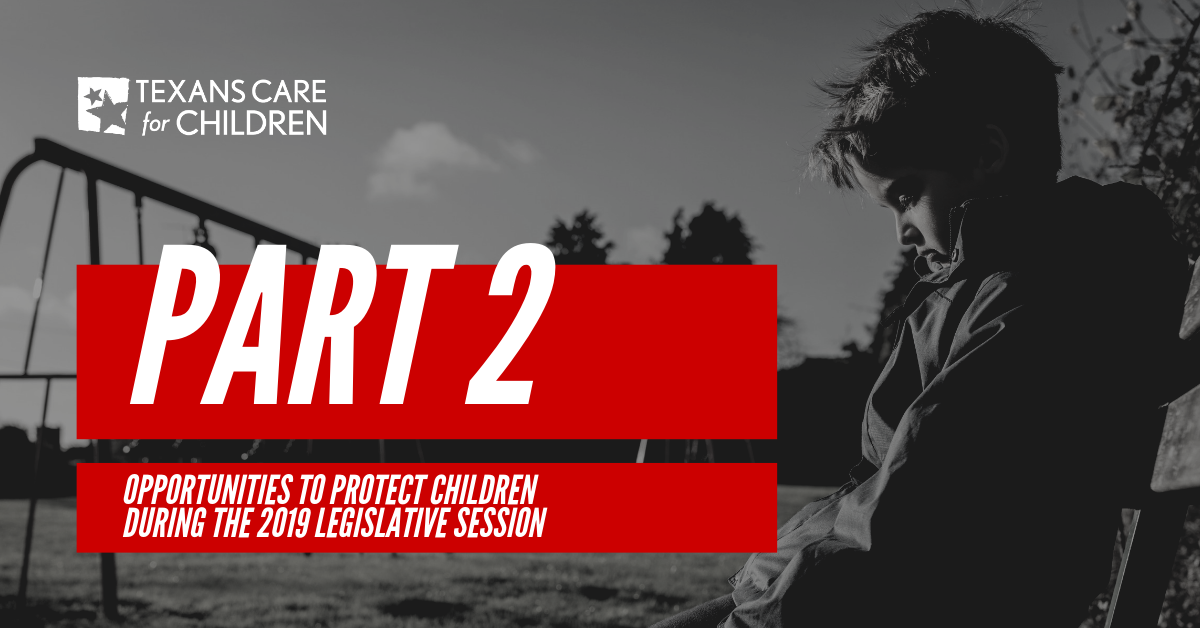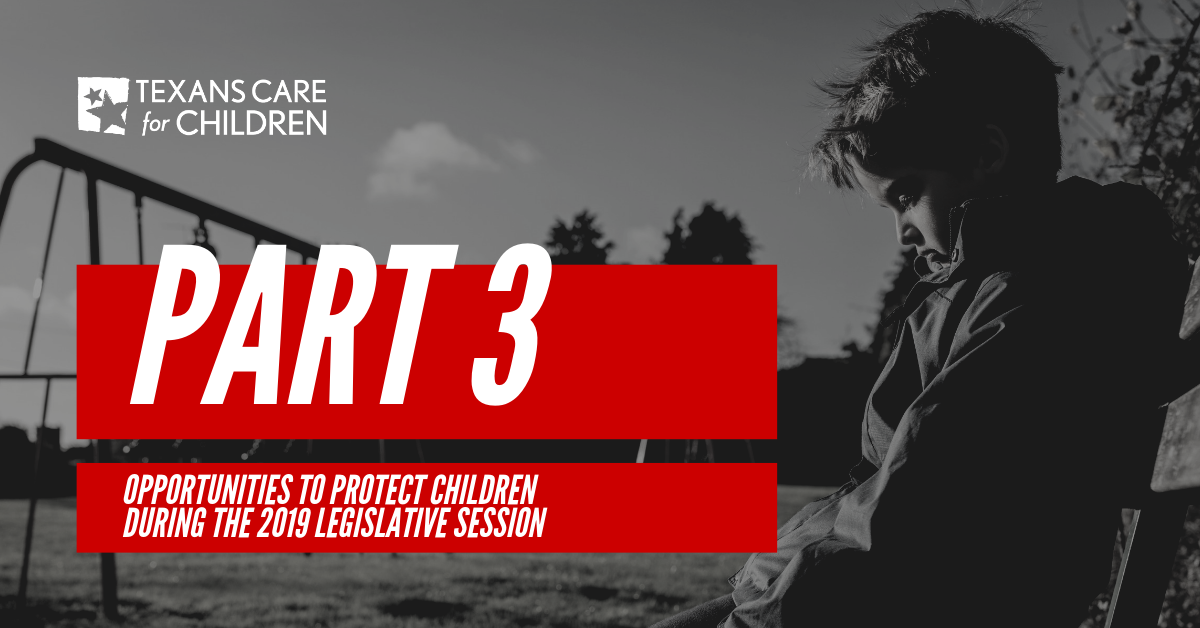This is part four of a five-part policy brief: Opportunities to Protect Children During the 2019 Legislative Session.
Below are recommendations for how the state could enhance child safety in foster care. These recommendations focus on reducing caseloads for foster care caseworkers, elevating standards for residential treatment centers and foster family homes, strengthening oversight of licensed foster homes and facilities, and improving the DFPS data system.
To Improve Safety, Texas Must Reduce Caseloads for Foster Care Caseworkers
BACKGROUND ON CASELOADS
Caseworkers make life and death decisions about the children in their care every day. However, if caseworkers are responsible for too many cases at once, the children under their care are at greater risk of harm. In fact, the Fifth Circuit judges highlighted this risk by finding that:
“The evidence in the record establishes that the State is deliberately indifferent to the risks posed by its policies and practices toward caseload management. The State is well-aware that caseworkers have unmanageable workloads. It also knows that high caseloads — which are a direct cause of high turnover rates — have a negative impact on . . . children’s welfare.”
The Legislature and DFPS recognize the need for a robust child protection workforce, but the efforts to reduce caseloads and turnover at DFPS during the 2017 legislative session primarily concentrated on DFPS staff tasked with investigating allegations of abuse and neglect, rather than caseworkers caring for children already in foster care. In late 2016, legislative leaders urged DFPS Commissioner Hank Whitman to ask for the support he needed, and the Commissioner boldly asked for critical funding to ensure investigators were able to quickly respond to allegations of abuse and neglect. The Legislature approved funding to hire 829 new caseworkers and increase salaries for existing ones. Then, during the 2017 legislative session, the Legislature sustained this critical investment and increased support for even more new caseworker positions. Although average investigations caseloads dropped from 17.1 per caseworker in fiscal year 2016 to 14.5 in fiscal year 2017 and an estimated 13.5 in 2018, foster care or “conservatorship” caseloads remain high. In 2016, the average foster care caseload in Texas was 29.7 per caseworker. In 2017, it dropped to 27.8 and DFPS estimated a 2018 average caseload of 26.5. National standards suggest a safe conservatorship caseload range is 8-15*, indicating that Texas caseloads may be at dangerously high levels.
The Fifth Circuit judges asserted that Texas’ reliance on high-volume hiring has not effectively reduced caseloads and the state should set a target caseload range to ensure child safety. In response, the District Court’s latest order requires DFPS to conduct a workload study to help the state establish caseload ranges that ensure primary caseworkers maintain monthly face-to-face visits with the children in their care.
Although Texas has more work ahead to reduce caseloads, it is worth highlighting two bright spots that have helped reduce turnover and improve workload management. Prior to the 2017 legislative session, DFPS developed and implemented a new training for caseworkers called CPS Professional Development. Statewide implementation of this training is required by the District Court’s new order, but Texas is already compliant. DFPS also developed a tool called Insight to assist caseworkers with critical tasks related to cases and to help supervisors determine the complexity of cases to assist them in assigning caseloads to caseworkers. The case complexity function may assist in the assignment of cases after the completion of a caseload work study and the establishment of appropriate guidelines.
RECOMMENDATIONS ON CASELOADS
Support the DFPS LAR Exceptional Item #1 ($116.7 million in All Funds) to maintain current caseloads and projected caseload growth.
Invest in a workload study that will set target caseloads that ensure child safety in the Texas foster care system and support DFPS compliance with the District Court order.
To Improve Safety, Texas Must Strengthen Standards for Licensed Foster Care and Oversight and Enforcement of Those Standards
BACKGROUND ON STANDARDS
Although Texas has many wonderful foster care placements, Texas could reduce safety concerns by elevating the quality of care required in licensed foster care facilities and licensed foster family homes. The FFPSA, or Family First Act, presents Texas with an opportunity to do just that.
Texas should reevaluate its standards for RTCs, which are operations that exclusively provide treatment services for children with emotional disorders. RTCs are often used to stabilize children with complex needs. While a necessary and important component of the foster care system, this type of out-of-home placement should be short-term.
Under the FFPSA, the federal government wanted to ensure it was only paying for high-quality foster care. For the type of care provided in RTCs, the federal government set out new standards that most residential facilities will have to meet to qualify for reimbursement. The FFPSA refers to these higher quality providers as Qualified Residential Treatment Programs (QRTPs). The new standards require trauma- informed treatment, onsite nursing and other clinical staff, improved family engagement in treatment, enhanced discharge services, and accreditation. The FFPSA also requires regular, ongoing assessment of the need for residential services to ensure only children who are in need of this restrictive level of service are placed in these more institutional settings as opposed to foster family homes. Texas currently has very few providers that meet the new standards and therefore is not only at risk of losing federal funding for foster care but also failing to consistently provide the highest quality of care. The FFPSA does not require RTCs to become QRTPs, but federal funding will only reimburse those that are. If RTCs are not all held to the same high standards following implementation of the FFPSA, Texas risks creating a two-tiered system in which only some children with complex emotional needs would be able to access high-quality treatment.
In addition to addressing RTCs, Texas should also protect child safety in foster family homes while simultaneously reducing the bureaucratic challenges faced by foster parents. The FFPSA required the U.S. Department of Health and Human Service to establish model licensing standards for foster family homes. These model standards are safety-focused and more flexible than Texas’ current licensing standards.
BACKGROUND ON OVERSIGHT
Too often, after Texas places a child in foster care, Texas does not adequately investigate allegations of abuse and neglect in licensed foster homes and facilities and enforce standards designed to protect children. Both the federal foster care lawsuit and a recent report from the Texas Foster Care Ombudsman reveal that, in some cases, divisions of state agencies charged with protecting children — including Child Protective Investigations (CPI), Child Care Licensing (CCL), and CPS — are falling short. Together, the Ombudsman report and the federal lawsuit highlight serious allegations of abuse and neglect that have been inadequately addressed, including the use of illegal restraints such as chokeholds, sexual abuse, and even multiple child deaths.
During the 2017 legislative session, lawmakers recognized that strong investigations and enforcement of safety standards are vital for protecting children under DFPS’ care. The Legislature passed HB 249 to strengthen investigations of abuse and neglect in licensed foster homes and facilities. Similar and additional language was also included in HB 5 and SB 11. The intent of these bills was to put child safety first and apply the same standards to investigations of abuse and neglect regardless of whether maltreatment occurred in a biological home or a foster home or facility.
Child Care Licensing (CCL) subsequently moved from DFPS to the Texas Health and Human Services Commission (HHSC ). CCL is responsible for regulating and overseeing child care providers; residential child care facilities such as cottage homes, residential treatment centers, and emergency shelters; and the child placing agencies which license foster homes. The Child Protective Investigations division of DFPS is responsible for investigating allegations of child abuse and neglect in foster care, child care, and biological families.
Despite the legislative effort to strengthen investigations in licensed foster care, the Fifth Circuit found in 2018 that inadequate state monitoring and oversight of licensed facilities remains a problem, noting that:
“DFPS is aware of the systemic deficiencies plaguing its monitoring and oversight practices. It also knows that these deficiencies pose a significant safety risk for foster children. Despite this knowledge, DFPS has not taken reasonable steps to cure the problems. Indeed, it is not clear that it has taken any steps at all.”
One step the state should take is to require Residential Child Care Licensing (RCCL) and CPI to report more information about their investigations of licensed foster homes and facilities. Currently, CPS publicly reports significantly more detailed information on investigations of abuse and neglect in biological family homes than in licensed foster homes and facilities.
RECOMMENDATIONS FOR STANDARDS AND OVERSIGHT
Embrace new opportunities through the Family First Preservation Services Act (FFPSA) to elevate the quality of care provided in licensed foster homes and facilities by:
Phasing in new minimum standards for all Residential Treatment Centers (RTCs) that align with the new federal QRTP requirements;
Providing start-up grants to help offset the costs of accreditation or other structural changes required for an RTC to maintain its licensure; and
Reviewing minimum standards for foster family homes and aligning Texas minimum standards with new model licensing standards developed at the federal level.
Ensure DFPS and HHSC are appropriately implementing HB 249, legislation passed in 2017 to strengthen investigations of abuse and neglect in licensed foster homes or facilities.
Align reporting requirements for investigations of abuse and neglect in foster homes with those for Child Protective Investigations in biological family homes to improve accountability, transparency, and child safety.
To Improve Safety, Texas Must Make Data System Improvements
BACKGROUND ON DATA SYSTEMS
For caseworkers to ensure child safety, they have to be able to access information about a child’s placement, history, health, education, any juvenile justice involvement,** and more. The Fifth Circuit panel noted DFPS’ haphazard record-keeping makes it unreasonably difficult for caseworkers to navigate a child’s case file and assure each child’s safety. Under the District’s Court’s order, DFPS is required to develop a new integrated computer system to keep all records in a centralized electronic database so caseworkers and others involved in a child’s case can easily locate the information they need to ensure they are meeting the needs of each child.
The state has been in the process of modernizing IMPACT for years, but the changes and investments to date do not resolve the issues. Furthermore, the deficiencies cited by the federal courts require changes that go far beyond existing efforts to improve the IMPACT system.
Beyond the basic record-keeping challenges highlighted in the lawsuit, a data system that can interact with other state and contractor data systems would ensure that information critical to child safety is consistently recorded and preserved. The FFPSA also requires some technological updates to all state data systems to allow interstate interoperability if a child is placed out of state. Texas has more work to do to improve data system effectiveness and comply with federal requirements under the FFPSA as well as the District Court order.
RECOMMENDATIONS ON DATA SYSTEMS
Invest in a new interoperable data system that contains each child’s “complete records, including but not limited to a complete migration of all medical, dental, educational, placement recommendations, court records, mental health and caseworker records”36 and ensure that the new system maximizes child safety by meeting the needs of providers and caseworkers in Texas’ evolving child protection system.
* DFPS calculates caseloads in “stages” that may include the parent and child. The National standard is based on a child-only sized caseload. DFPS has not provided a directly comparable caseload.
** The Juvenile Justice Committee for the Texas Judicial Council highlighted the need for improved data sharing. Juvenile Justice Committee Report and Recommendations 8-9 (Tex. Judicial Council 2018) available at http://www. txcourts.gov/media/1441880/juvenile-justice-committee-report.pdf.

